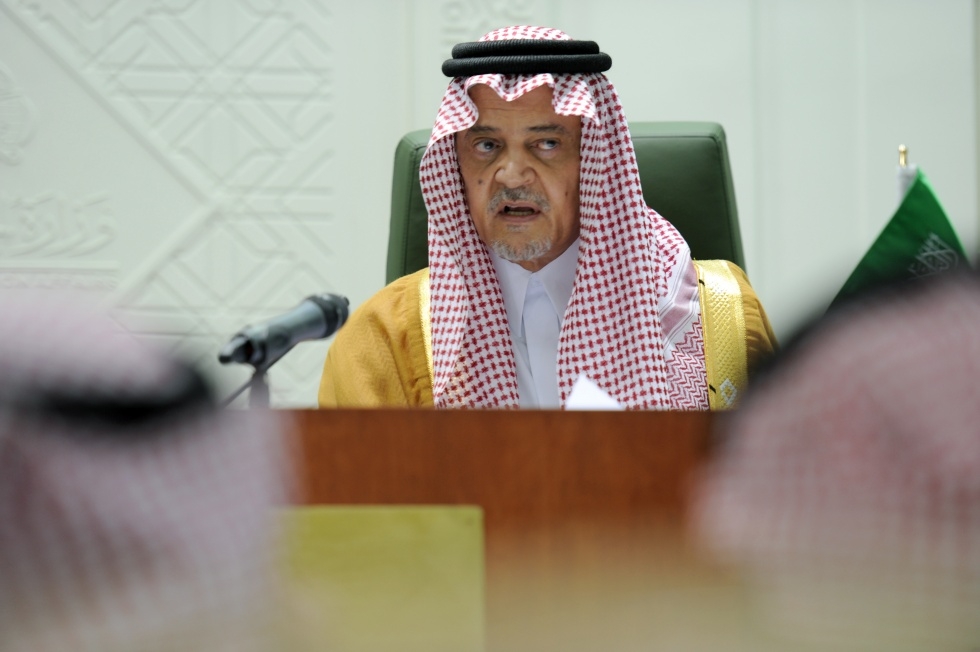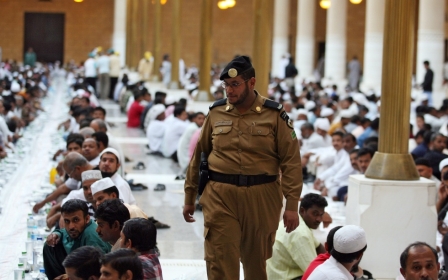Saudi moves linked to survival

A quest for survival perhaps best explains the Saudi dynasty’s latest external and internal policies, which have included an attack on the legitimacy of the Muslim Brotherhood internationally and an internal crackdown on dissent. The monarchy likely hoped that these manoeuvres would pre-empt change, but so far they have only created more enemies for Saudi Arabia as the world order evolves and realities inside the kingdom rapidly shift.
A key pillar of Riyadh’s foreign policy, its strategic alliance with the US, appears under growing strain. With the US now committed to a “pivot” to the Asia-Pacific and possibly on track to become an oil exporter by 2017, it seems American and Saudi policies are diverging.
It was former US president George W Bush’s pro-democracy campaign in the 2000s which first alerted Saudi Arabia’s rulers to beware any prospects of “regime change”. The Arab Spring protests that have rocked the region since 2011 further pushed them onto the defensive.
Saudi fears of a regime change strategy have in recent months focused on the Muslim Brotherhood as a potential instrument of change, especially as the group is supported by regional rivals Turkey and Qatar. Doha has also long contested the Saudi leadership of the Gulf Cooperation Council (GCC), as well as its leading role in Arab politics and in representing Sunni Muslims.
This trilateral alliance of Turkey, Qatar and the MB could indeed develop into a real threat to Saudi Arabia’s survival if succeeds in delivering change in Syria, Iraq, Egypt and elsewhere in the region.
New MEE newsletter: Jerusalem Dispatch
Sign up to get the latest insights and analysis on Israel-Palestine, alongside Turkey Unpacked and other MEE newsletters
However, it is the religious nature of the MB that presents such a threat to Riyadh.
“It might seem ironic for a Wahhabi theocracy to oppose so forcefully a party that mixes religion with politics. But it is precisely because the monarchy bases its legitimacy on Islam that it fears Brotherhood rivalry,” journalist Roula Khalaf wrote in the Financial Times in March.
In terms of US ties, Obama doesn’t seem capable of mending fences. His refusal to become embroiled in the Syrian war is like a betrayal to Saudi’s rulers, and harks back to a remarks as a state senator back in 2002:
“Let's fight to make sure our so-called allies in the Middle East - the Saudis and the Egyptians - stop oppressing their own people, and suppressing dissent, and tolerating corruption and inequality, and mismanaging their economies.”
However, as demonstrated by Obama’s visit to the kingdom on March 28, the strategic alliance will hold until the kingdom finds a credible alternative to its American security guarantor – something that remains an unrealistic development in the foreseen future.
Failed initiatives
Regional shifts can be seen in a disintegration of a US-promoted and Saudi–advocated anti-Iran “front” of regional “moderates” with Israel as an undercover member. Meanwhile, Oman’s public threat to withdraw from the GCC should it transform into a union threatens the grouping’s very existence.
Saudi initiatives are failing on multiple fronts. A Saudi invitation to Jordan and Morocco to join the GCC was not welcomed by GCC members, and the latest Kuwait-hosted Arab Summit showcased the fallout over Syria.
Egypt’s calls for a “political solution” in Syria and its refusal to give the Syrian Arab League a seat undercut Saudi, especially following the massive bailouts Riyadh dished out to Egypt in return for transitioning away from a MB rule.
Attempts to form a Lebanese government without Hezbollah and its pro-Syria coalition have failed, while Iraq is accusing the kingdom of waging a “war” against it. Meanwhile, the kingdom continues to deal with Iran as an “existential threat” while the Israeli threat simmers in the background.
Using petrodollars to gain influence abroad and secure loyalty internally, the kingdom had in recent years seemed overconfident.
In a US speech in mid-March Prince Turki al–Faisal, chairman of the King Faisal Center for Research & Islamic Studies in Riyadh and former Saudi Ambassador to the US, was candid about the kingdom’s might.
“Saudi Arabia represents over 20% of the combined GDP of the Middle East-North Africa [MENA] region making it … an effective partner and member of the G20,” he said. “The Saudi stock market represents over 50% of the entire stock market capitalization of the MENA region.”
He also added that Kingdom’s central bank was the world’s third largest holder of net foreign assets and stressed that the kingdom’s national oil company, was the world’s largest producer and exporter of petroleum with the a world’s largest sustained production capacity infrastructure.
However, there are cracks in this veneer. Veteran journalist Karen Elliot House, has presented a starkly ominous picture.
According to House, 60% of Saudis are 20 or younger, but many of “have no hope of a job” while 70% of Saudis cannot afford to own a home and 40% live below the poverty line.
As House argues in her 2012 book: “The royals, 25,000 princes and princesses, own most of the valuable land and benefit from a system that gives each a stipend and some a fortune. Foreign workers make the Kingdom work; the 19 million Saudi citizens share the Kingdom with 8.5 million guest workers.”
Moreover, regional differences are “a daily fact of Saudi life”. Hejazis in the West and Shiites in the East resent the strict Wahhabi lifestyle. Gender discrimination is a growing problem – women make up 60% of college graduates are women but account for 12% of the work force.
Despite these internal challenges, the kingdom has squandered billions in a lost battle to finance a regional counterrevolution. Some $20bn were pledged to help Bahrain and Oman deal with the Arab Spring, while $3bn was pledged to buy French arms to prop up the Lebanese army and an additional $7bn pledged to boost the post-Morsi Egypt. This is not to mention the billions allegedly spent on financing the Syrian opposition. Even Ukraine could see an influx of Saudi money Obama asked for Saudi assistance during his latest visit.
But what has been spent internationally, is only a fraction of what Saudi has spent buying the loyalty of its own people. In February 2011 alone King Abdullah pledged more than $35 billion for housing, salary increases for state employees, studying abroad and social security. The next month the king announced another financial package worth more than $70 billion for more housing units, religious establishment and salary increase for military and security forces.
Even these huge sums though don’t seem to be enough to secure internal stability and prevent the fear of protest. Instead of relaxing the internal situation, Saudi in January tightened the screws by criminalizing the participation “in hostilities outside the kingdom,” and in March issuing an initial list of terrorist organizations.
“These recent laws and regulations turn almost any critical expression or independent association into crimes of terrorism,” Joe Stork, the deputy director of the Human Rights Watch for the MENA region said in a statement. “These regulations dash any hope that King Abdullah intends to open a space for peaceful dissent or independent groups.”
The overreaching outcome is that internally and externally, the kingdom seems intent on creating more enemies, neutralizing none, alienating world and regional powers, as well as mainstream Sunni, Shiite, liberal, pan-Arab and leftist forces. It is wrecking regional havoc, all in what looks like an unbalanced reaction to threats, real and perceived, to the survival of the ruling dynasty. In doing so, however, the kingdom seems to be shooting its survival in the foot.
— Nicola Nasser is a veteran Arab journalist based in Bir Zeit, West Bank of the Israeli-occupied Palestinian territories. He writes about the Arab world affairs, Arab-regional and Arab-US relations with a focus on the Palestinian – Israeli conflict.
The views expressed in this article belong to the author and do not necessarily reflect the editorial policy of Middle East Eye.
(Photo credit: AFP)
Middle East Eye delivers independent and unrivalled coverage and analysis of the Middle East, North Africa and beyond. To learn more about republishing this content and the associated fees, please fill out this form. More about MEE can be found here.



